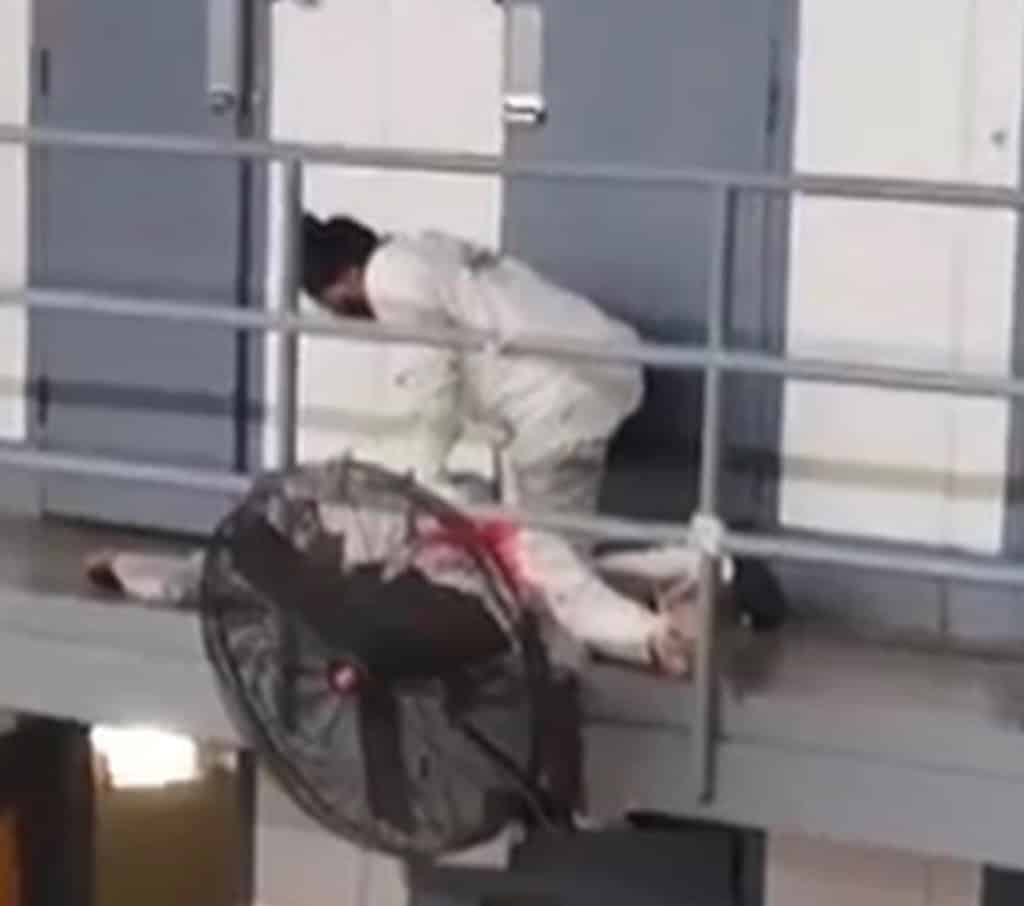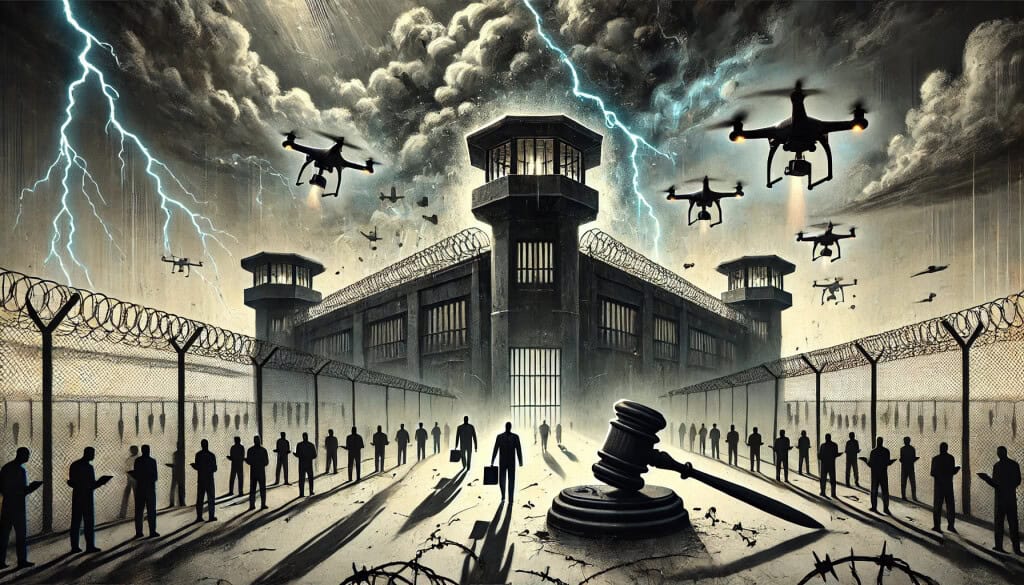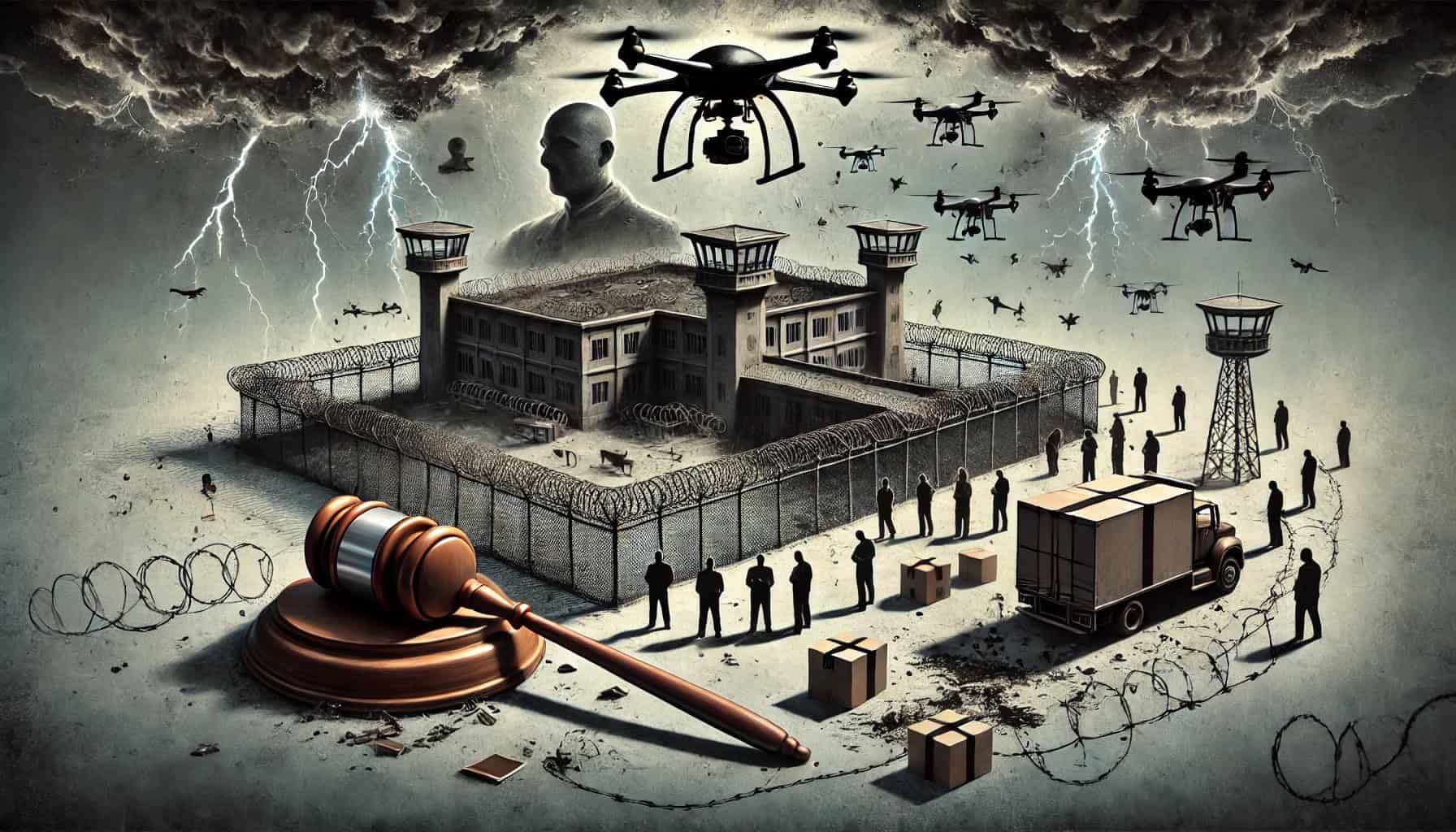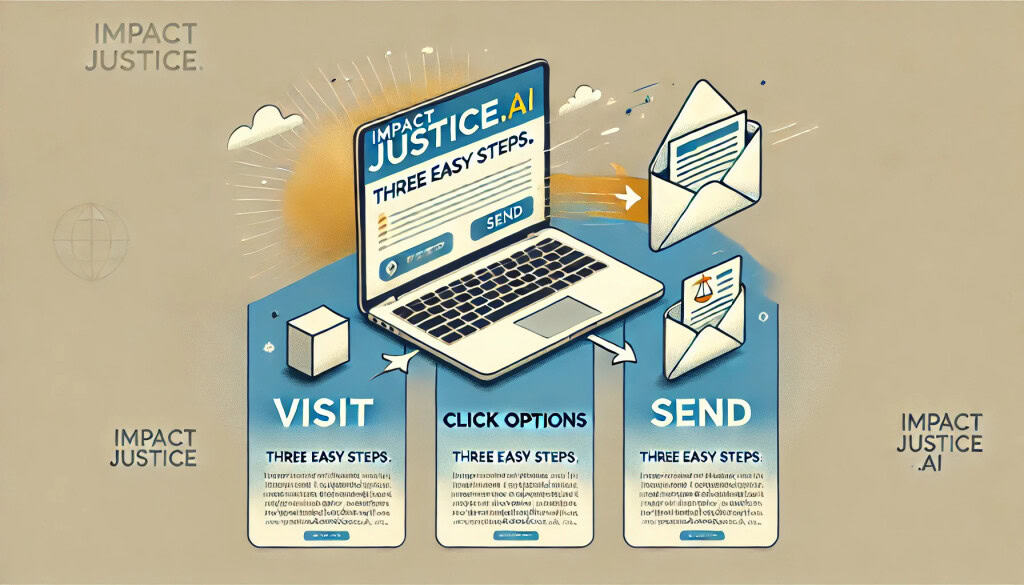Introduction
Behind the imposing fenses of Washington State Prison lies a chilling narrative of systemic failure, unchecked power, and devastating human cost.

On January 7, Dontavis Carter was found lying in a pool of blood—his life cut short by a brutal act of violence. Carter’s murder is not an isolated incident but a grim symptom of the broader dysfunction within the Georgia Department of Corrections (GDC), where corruption, neglect, and lawlessness often overshadow accountability and justice.

Reports from inside the prison paint a harrowing picture: gang leaders wielding unchecked power, contraband flowing freely through drone drops, and officials accused of enabling or ignoring these activities. For many inmates, safety is a fleeting illusion, while families outside the prison walls are left grappling with unanswered questions and unimaginable loss.
This article delves into the systemic failures that allow such atrocities to persist, exposing the dangerous intersection of corruption, violence, and institutional negligence. Drawing on testimonies from inmates and whistleblowers, it reveals a system in crisis and underscores the urgent need for reform in Georgia’s prisons.
A System in Chaos

Washington State Prison, like many facilities under the Georgia Department of Corrections (GDC), has become a breeding ground for violence, corruption, and systemic neglect. Inside its walls, gang activity flourishes unchecked, contraband flows with alarming ease, and the very individuals tasked with maintaining order are frequently accused of complicity.
The murder of Dontavis Carter on January 7 serves as a grim testament to these failures. Reports suggest that gang leaders operate with impunity, leveraging bribes, technology, and fear to control operations both inside and beyond the prison walls. In this shadow economy, contraband—ranging from drugs to weapons—enters the prison through drone drops, allegedly facilitated by insiders. While some correctional officers are implicated in directly smuggling contraband, the rise of drone technology has given them a safer, more discreet alternative. By merely turning a blind eye or actively coordinating movements, officers can maintain plausible deniability while still profiting from their complicity.
For inmates, this chaotic environment turns daily life into a gamble for survival. Safety is a fleeting privilege, and accountability is virtually nonexistent. Prisoners have recounted instances of being extorted, coerced into silence, or subjected to violence, while staff reportedly ignore these abuses or actively contribute to them.
Families of inmates have long raised concerns about these deteriorating conditions, filing complaints, and seeking transparency from GDC leadership. Yet, Carter’s death is a stark reminder that such pleas often fall on deaf ears. His murder is not just a tragedy—it is a glaring symptom of a system failing to fulfill its most basic responsibilities.
Complicity and Corruption
The murder of Dontavis Carter casts a glaring spotlight on the systemic corruption within the Georgia Department of Corrections (GDC). Reports and investigations reveal a troubling culture of complicity, where some of those entrusted to maintain order instead facilitate chaos and enable criminal enterprises.
The Role of Staff in Contraband Networks
Evidence from multiple investigations, including findings from the Atlanta Journal-Constitution, highlights the involvement of GDC employees in contraband smuggling operations . At Washington State Prison, Deputy Warden of Security Ricky Alexander has been accused of facilitating contraband delivery through drone drops and even ensuring that gang leaders receive these illicit items. Alexander allegedly plays a key role in these operations, with whistleblowers claiming he orchestrates the flow of contraband while turning a blind eye to its consequences.
While drones represent a technological shift in contraband delivery, prison staff reportedly remain deeply complicit. Officers and officials are said to accept bribes or participate in logistics, often earning thousands of dollars for their involvement. These actions not only strengthen gang hierarchies but also create an environment where violence and criminal activities flourish.
Complicity in Violence
Carter’s death also underscores staff complicity in perpetuating violence. Reports suggest that following his murder, D/W Alexander addressed inmates directly, warning them “if they see a murder about to happen, they better leave the room”—In other words make sure you are not a witness so bad things don’t happen to you. Such directives create a chilling atmosphere of silence, where potential witnesses fear retaliation or false accusations.

This culture of fear extends to allegations against Warden Veronica Stewart. Known for strict enforcement of minor infractions, Stewart has been criticized for turning a blind eye to larger issues, such as the gang activities within Building I-2. Her inconsistent leadership raises serious questions about the priorities and accountability of those in charge.
Judicial Critiques and Failures to Reform
The systemic issues within the GDC are not new. A federal judge recently imposed fines and an independent monitor on the GDC for failing to comply with court-ordered reforms aimed at addressing misconduct and inhumane conditions. The court’s findings included falsified records, stalling tactics, and a disregard for oversight.
Carter’s murder, coupled with these reports of corruption and negligence, exemplifies the broader failures of the Georgia prison system. Without meaningful reforms—starting with accountability for staff members like Alexander and Stewart—these systemic issues will continue to endanger lives and undermine the integrity of the GDC.
A Culture of Fear and Violence
For inmates at Washington State Prison, fear is an ever-present reality. The murder of Dontavis Carter is not just another tragic statistic; it exemplifies the systemic violence that permeates the Georgia prison system. But the impact of this violence extends far beyond prison walls, devastating the families of those who are incarcerated.
A Daily Reality of Fear
Inmates describe Washington State Prison as a powder keg, where violence is a constant threat, and survival often depends on silence. Following Carter’s murder, reports emerged that prison staff warned inmates to avoid witnessing or documenting violent incidents. Those who stay to help a victim or record the crime risk being implicated themselves. Such policies, designed to stifle accountability, only embolden those who perpetuate the violence.
Gang leaders thrive in this environment, using threats, coercion, and brutality to maintain their grip on power. Inmates who attempt to report incidents or seek help are met with retaliation, either from their peers or, alarmingly, from those in charge. “Fear is a method of control,” one inmate stated in a previous story, “and we live in constant fear every day. Not just from each other, but from the people who are supposed to keep us safe.”
The Impact on Families
The ripple effects of this fear and violence reach the families of inmates, who endure an emotional rollercoaster of worry, helplessness, and grief. In Carter’s case, his family learned of his death through devastating secondhand accounts, leaving them with more questions than answers. “It’s like a piece of our soul was ripped away,” one mother shared in a past story. “They took him from us, and now we’re left to pick up the pieces.”
Families face not only the loss of their loved ones but also the crushing reality that the system responsible for their safety has failed them. In a previous story about Roy Mason Morris, his sister described the anguish of learning he had died 14 months before the family was even informed. “They didn’t just bury him—they buried the truth,” she said. “Now we’re left to fight for answers while grappling with a loss we never saw coming.”
This cycle of silence and impunity erodes trust and deepens the emotional wounds of those on the outside. For many families, the knowledge that their loved ones are trapped in an environment where safety is scarce and violence is routine creates a sense of helplessness that is almost unbearable.
A System Built on Neglect
The neglect and violence within Georgia prisons are not new phenomena; they are systemic failures that have persisted for decades. Stories of inmates being denied medical care, starved of basic necessities, or subjected to abuse underscore the depth of the problem. Families of inmates have repeatedly called for reform, but their voices are often drowned out by the indifference of those in power.
Carter’s murder, like so many others, reveals a system that prioritizes control over humanity, silence over transparency, and profit over rehabilitation. The cost of these failures is borne not only by the inmates who endure them but also by the families who must live with the consequences.
The Systemic Failures of the GDC
The Georgia Department of Corrections (GDC) has long been criticized for its inability to provide safety, transparency, and accountability within its facilities. The murder of Dontavis Carter at Washington State Prison is the latest example of these failures, but it is far from an isolated incident. Instead, it highlights systemic issues that plague the entire prison system—issues that have led to a staggering loss of life.
Staggering Death Rates
In 2024, over 300 inmates died while in GDC custody, with at least 100 confirmed homicides. These numbers underscore the violent and dangerous conditions within Georgia’s prisons. Alarmingly, 2025 has already seen 12 confirmed homicides, including Carter’s murder, and the year has only just begun. These statistics reveal a systemic failure to ensure even the most basic standard of safety for incarcerated individuals.
Infrastructure and Security Failures
Washington State Prison, like many other GDC facilities, suffers from severe infrastructure and security issues. Reports of a physical hole in one of the prison buildings, allowing individuals to enter and exit undetected, symbolize the breakdown of even the most basic security measures. Similar vulnerabilities have been reported in other facilities, where contraband and violence go unchecked, creating an environment of chaos and lawlessness.
One glaring example of neglect is the unresolved “blue water” issue, a long-standing symbol of inadequate infrastructure that persists despite years of complaints. Inmates have also described receiving insufficient food and inadequate medical attention, reflecting a broader disregard for their well-being. These conditions not only endanger lives but also undermine the basic principles of rehabilitation and human dignity.
Parallels Across the GDC
The issues at Washington State Prison are not unique. At Wilcox State Prison, for example, nine inmates were stabbed or slashed during a single violent outbreak in 2022. Similarly, at Ware State Prison, a coordinated gang-related riot in 2020 left two inmates dead and over a dozen injured, highlighting the GDC’s inability to control gang activity within its facilities. These incidents demonstrate a pattern of neglect and mismanagement that extends across the entire system.
A System That Prioritizes Profit Over Rehabilitation

Critics argue that the GDC’s failures are rooted in a system that prioritizes profit over rehabilitation. Inmates and advocates alike have pointed to the profit-driven nature of the prison system, where funding is directed toward expanding facilities and hiring undertrained staff rather than addressing systemic issues like overcrowding, mental health care, and gang control.
Carter’s death is emblematic of this broken system. Despite repeated warnings and reports from inmates and their families, the GDC has failed to implement meaningful reforms. Instead, the department’s focus remains on punitive measures and maintaining control, often at the expense of safety, transparency, and accountability.
The Need for Urgent Reform
The systemic failures of the GDC demand immediate attention. Insiders and Whistleblowers have consistently highlighted these issues, but meaningful change remains elusive. Without structural reforms to address staffing shortages, infrastructure failures, and a culture of corruption, the GDC will continue to be a breeding ground for violence and neglect.
Carter’s murder is not just a tragedy—it is a call to action. If the GDC is to fulfill its mandate of rehabilitation and safety, it must confront the deep-rooted issues that have turned Georgia’s prisons into dangerous and inhumane environments.
Conclusion: A Call for Accountability
The murder of Dontavis Carter is more than just another statistic in Georgia’s troubled prison system—it is a vivid testament to the systemic failures of the Georgia Department of Corrections (GDC). Carter’s death underscores a grim reality: Georgia’s prisons are not just places of incarceration, but environments where violence, corruption, and neglect flourish unchecked.
In 2024, over 300 inmates died in GDC custody, with at least 100 of those deaths classified as homicides. Carter’s murder is one of 12 confirmed homicides in 2025—a sobering statistic given that the year has just begun. These numbers expose a system that has not only failed to protect those within its walls but has also allowed a culture of fear and lawlessness to thrive.
This is not merely about statistics. It is about lives lost and families shattered. Behind every number is a story of pain, unanswered questions, and a justice system that has failed to deliver on its most basic promises. Carter’s family, like so many others, now bears the unbearable burden of grief compounded by the knowledge that his death could have been prevented.
Yet, accountability cannot be achieved through silence. The GDC’s systemic failures demand urgent and transparent investigation, not only into Carter’s death but also into the broader patterns of neglect, corruption, and violence that permeate the system. Advocacy groups, investigative journalists, and whistleblowers must continue to shine a light on these injustices, bringing public attention to the urgent need for reform.
Change cannot come solely from within. It requires public pressure, legislative action, and a commitment to prioritize safety, dignity, and rehabilitation over control and profit. Platforms like Georgia Prisoners’ Speak (GPS) play a crucial role in amplifying the voices of those who would otherwise remain unheard, ensuring that stories like Carter’s are not forgotten. GPS developed and maintains a messaging system for advocates to send email messages to decision makers, GDC Officials and Media outlets to help bring awareness of this crisis to those who can make a difference. We encourage everyone to use this free tool to advocate for a more humane and safer prison system. You can find Impact Justice AI here.
Dontavis Carter’s death must serve as a turning point. It is a call to action for a system that has long prioritized power over humanity. The question now is not whether change is needed but whether those with the power to effect it will finally act. For the sake of Carter, his family, and the countless others who have suffered in silence, the time to act is now.


They need to release all inmates who are not in for violent crimes and this prison should be shut down due to negligence and this prison is just like many other prisons that should be shut down how can they say prison is for reform that’s a lie because people go to prison and don’t get reformed they get extorted or they are killed so prison is a money thing for the government it’s not to help the people they put away or helping the families hurt by the people who commit violent crimes it’s all a gimmick and Washington State is one of the worst prisons out here in Ga so please have this prison shut down and all prisoners not held for violent crimes should be release immediately
That’s the issue, everyone is thinking that inmates with violent offenses are doing this, but the reality is is the short term offenders that’s continually doing the dumb things.. the lifers who have been inside for 20 or more yrs try to help keep things under control but these young offenders with 2 to 5 yrs keep all the bs going